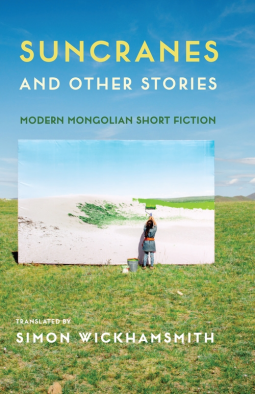
Suncranes and Other Stories
Modern Mongolian Short Fiction
by Translated by Simon Wickhamsmith
This title was previously available on NetGalley and is now archived.
Send NetGalley books directly to your Kindle or Kindle app
1
To read on a Kindle or Kindle app, please add kindle@netgalley.com as an approved email address to receive files in your Amazon account. Click here for step-by-step instructions.
2
Also find your Kindle email address within your Amazon account, and enter it here.
Pub Date Jul 06 2021 | Archive Date Oct 13 2021
Talking about this book? Use #SuncranesandOtherStories #NetGalley. More hashtag tips!
Description
Spanning the years following the socialist revolution of 1921 through the early twenty-first century, these stories from the country’s most highly regarded prose writers show how Mongolian culture has forged links between the traditional and the modern. Writers employ a wide range of styles, from Aesopian fables through socialist realism to more experimental forms, influenced by folktales and epics as well as Western prose models. They depict the drama of a nomadic population struggling to understand a new approach to life imposed by a foreign power while at the same time benefiting from reforms, whether in the capital city Ulaanbaatar or on the steppe. Across the mix of stories, Mongolia’s majestic landscape and the people’s deep connection to it come through vividly. For all English-speaking readers curious about Mongolia’s people and culture, Simon Wickhamsmith’s translations make available this captivating literary tradition and its rich portrayals of the natural and social worlds.
Advance Praise
"Suncranes and Other Stories is an important translation of modern Mongolian writing. Deftly translated, it opens a door on a body of literature that reflects the lives and realities of Mongolia in the twentieth and twenty-first century."
—Mark Bender, editor of The Borderlands of Asia: Culture, Place, Poetry
"Simon Wickhamsmith's masterful translations provide a unique window on how Mongolian writers have responded to events shaping the country over the last century—ranging from extreme communism to extreme capitalism—while also retaining a strong sense for enduring Mongolian traditions shaped by pastoral nomadism and a magnificent countryside."
—Jonathan S. Addleton, former US Ambassador to Mongolia
"This excellent first collection of modern Mongolian stories offers a view of traditional concerns of nature and herding, as well as the dramatic changes wrought by communism, the pure market economy, and urbanization. Wickhamsmith's translations provide readers with wondrous fiction as well as exposure to the unique Mongolian lifestyle."
—Morris Rossabi, author of Modern Mongolia: From Khans to Commissars to Capitalists
Available Editions
| EDITION | Other Format |
| ISBN | 9780231196772 |
| PRICE | $25.00 (USD) |
Average rating from 3 members
Featured Reviews
 Robert S, Reviewer
Robert S, Reviewer
This is a survey of Mongolian short stories from the 20th century, reflecting that country's passage from nomadic theocracy to socialist "paradise" to post-communist urban democracy. The stories are arranged mostly chronologically, illustrating the changes in society.
The stories cover a wide range of styles, from pastoral slices-of-life to existential internal monologues, and while one can see similarities to Russian and East Asian literature, these are something different, in my non-expert experience.
I can't speak to the quality of the translation, but the English is fluid and evocative. The translator also provides an introduction that provides context and background, as well as biographies of the authors.
Most importantly, the stories are fun to read. Several are quite memorable, and all are at least of the quality of what the New Yorker publishes.
 Pauline V, Reviewer
Pauline V, Reviewer
I pride myself of being curious and always ready to try new things, especially when it comes in short fiction (probably because I feel that I don’t commit too much time and energy if it’s bound to be over in 25 pages). But perhaps I am now getting to my limits. Talking about treading out of my comfort zone, this short story collection has been really challenging and puzzling.
I don’t think it’s the editor / translator’s fault, but I found very little to relate in any of those short stories. Wickhamsmith tries to give a large overview of the diversity of Mongolian writing throughout the 20th century, and he does it quite well in 27 stories that are very diverse in topics as in style. The English translation reads effortlessly, and there’s a useful glossary on Mongolian terms, but I could understand most of it from the context anyway. We get a bit of poetic / allegoric, a creepy ghost story, some love stories, some about family relationships… There’s also a very useful postface on each author and his/her context, but I really would have preferred to have it in a preface as most of the book felt like jumping in the pool feet first without really knowing how to swim.
I could say that I know nothing about Mongolia but that would be lying. The extent of my knowledge comes from my Asian studies and a summer internship program in 1997 where I was supposed to be churning out reports on Mongolia, but on that fateful summer Hong Kong returned to Mainland China and the Asian financial crisis hit many (other) Asian countries and my interest went far away from Mongolia. My understanding is that from the Chinese point of view, Mongolia is the poor hillbilly neighbor, although in historical terms the countries’ fate were intertwined (Genghis Khan was from Mongolia and Mongol dynasties rules over China for centuries) – and in economical terms, Mongolia depends very much on China. That I knew, but I had somehow missed the part where Mongolia had been heavily influenced by the Soviet Union, its other powerful neighbor.
That is why many stories in the beginning of the collection lean heavily on the socialist realist vein, and are clearly influenced by the later Russian literature. It’s hard to get passionate nowadays about stories speaking of production quotas and five-years-plan, although having read the equivalent Maoist stories I could get my bearing, if not my enthusiasm.
I was favorably impressed by the importance of nature in many of those stories. Pastoral nomadism is shown in its beauty and its hardships equally, and that’s the part I enjoyed the most. Other stories didn’t resonate with me at all, and I could not even get what I was reading. But again, this is entirely my fault. So this collection is a hit-and-miss for me, but I don’t regret trying.
Thanks to the publisher and Netgalley. I received a free copy of this book for review consideration.
Readers who liked this book also liked:
Marie Bostwick
Historical Fiction, Literary Fiction, Women's Fiction






